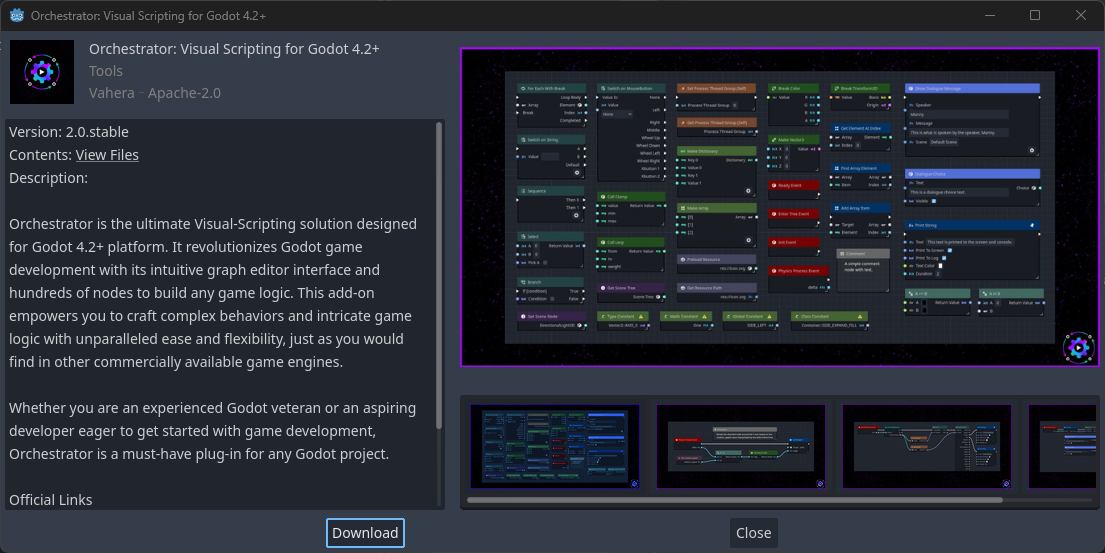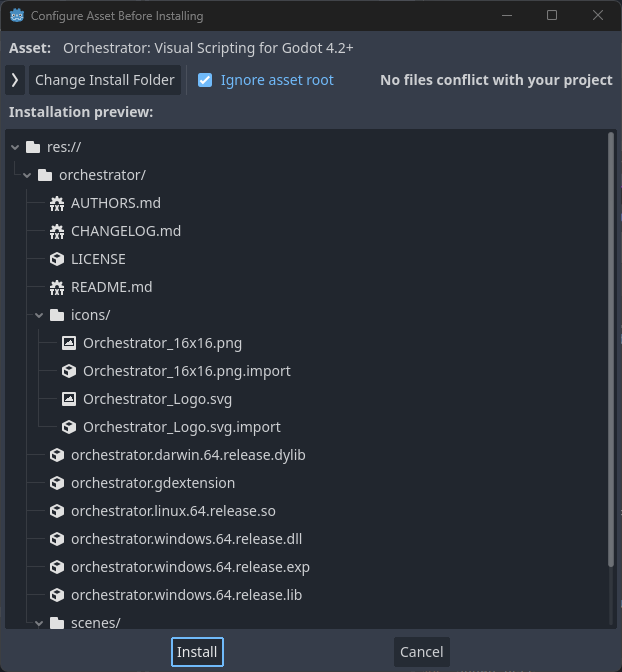Installation guide
There two ways to install the plug-in:
- Using the Godot Asset Library in the Godot Editor.
- Downloading the plug-in from our GitHub repository.
In this section, we'll cover how to use both.
Godot asset library
The Godot Editor has a built-in asset library feature, which allows users to search, download, and install Godot plug-ins, tools, and assets directly from their online asset catalog.
To access the Asset Library, we'll use the
In the search box, type Orchestrator or simply Scripting to locate the plug-in.
Click the plug-in's name to open the Information dialog.
Press the Download button to begin the download process. When the download finishes, you'll be prompted to Configure Asset Before Installing, shown here:
Uncheck the Ignore asset root option.
Failing the uncheck this option will not install the plug-in correctly into your project.
Finally, click the Install button, installing the plug-in into the res://addons/orchestrator directory.
After installation, the Godot Editor will prompt you to restart.
There is currently an issue with the Godot Editor with loading textures used by GDExtension plug-ins. The plug-in will be loaded before the textures are imported, causing the textures to not render initially or appear broken in some scenarios. Restarting the Godot Editor one final time fixes the issue.
Download from GitHub
If you are interested in pre-release builds or are having trouble installing the plug-in using the Godot Asset Library, you can also download the plug-in binaries directly from our GitHub Repository. To install from GitHub, simply follow these steps:
- Locate the latest release on the repository's Releases page.
примечание
While the repository page will show the latest stable release, if you are interested in pre-release builds, you will need to specifically look at the Releases page as pre-release builds are not listed on the main GitHub repository page.
- Once you've located the desired release, expand the Assets section if it isn't already.
- Locate the asset labeled
godot-orchestrator-<version>-plugin.zip, and click it.
This will download the artifact to your PC.
Once the artifact has been downloaded, it needs to be unzipped into your Godot project. If you have not already created a Godot project, you should create one first following these steps.
With the Godot project created, navigate to where you saved the downloaded file, and extract its contents directly into your Godot project's root-directory.
This should create a directory path like <project-root>\addons\orchestrator.
Once the files have been installed, focusing the Godot Editor will request to restart. Simply follow the prompt, restarting Godot, and the plug-in should be active when the editor restarts.
There is currently an issue with the Godot Editor with loading textures used by GDExtension plug-ins. The plug-in will be loaded before the textures are imported, causing the textures to not render initially or appear broken in some scenarios. Restarting the Godot Editor one final time fixes the issue.





